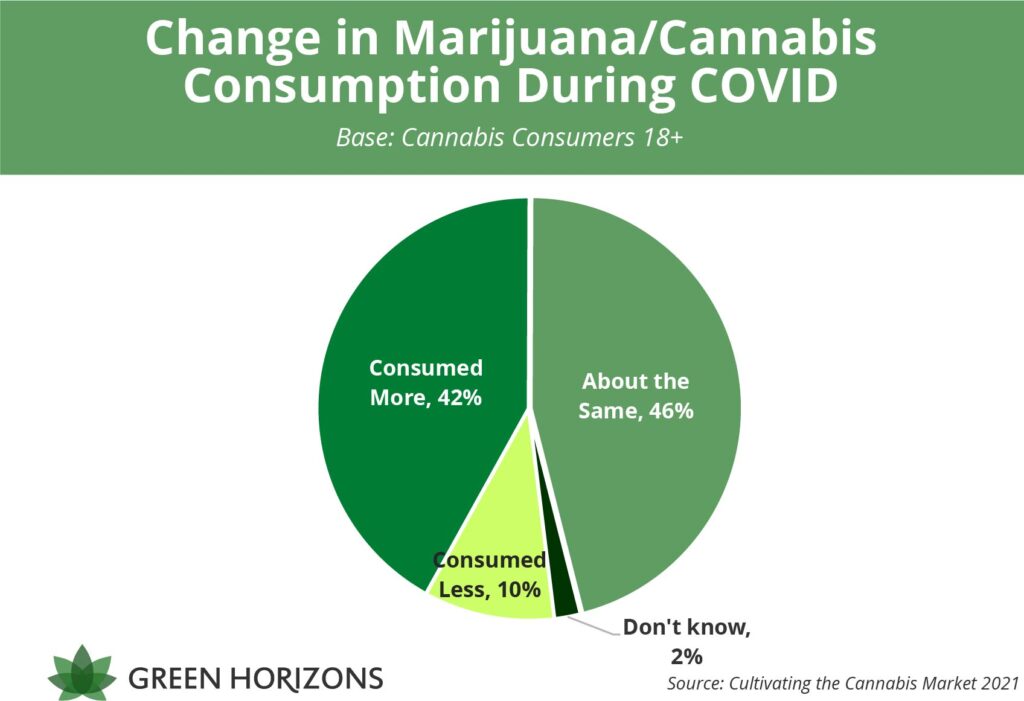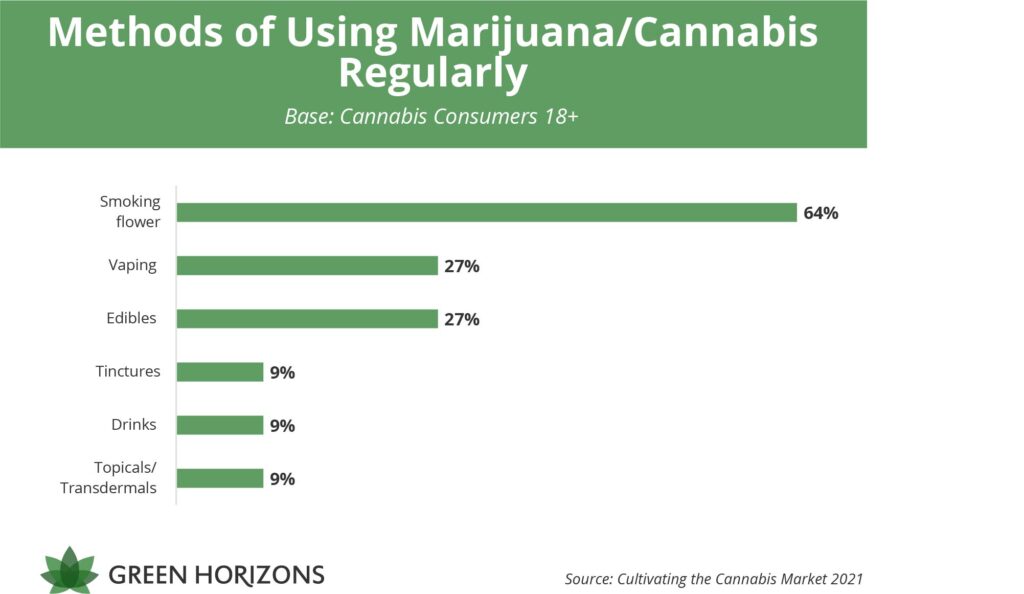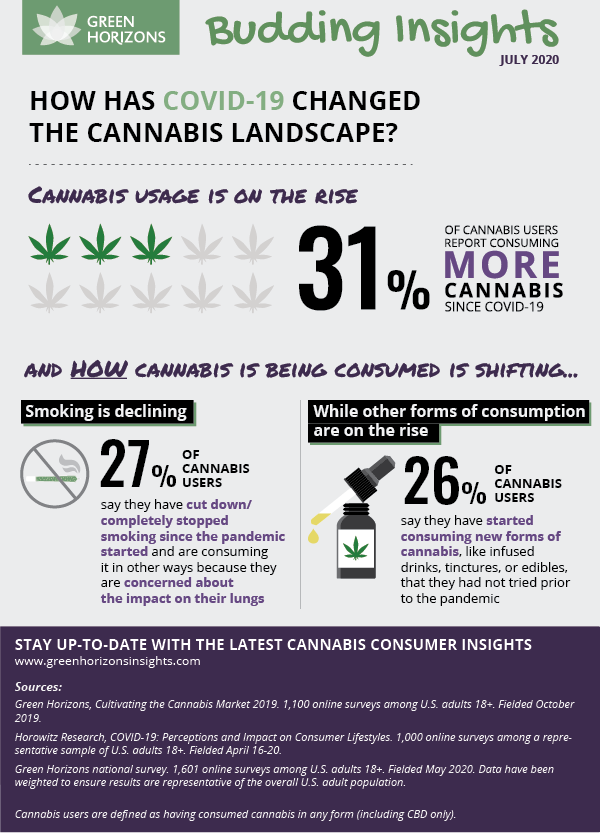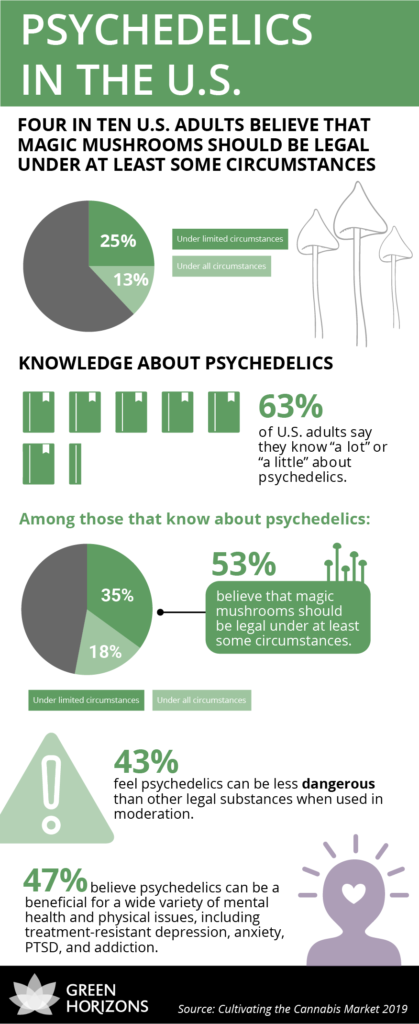NEW ROCHELLE, November 1st, 2021– The trend towards legalization of cannabis in the U.S. combined with the COVID-19 pandemic is driving cannabis adoption, according to a recent Green Horizons study. The study, fielded in August 2021 with Green Horizons field partner, Paradigm, found that the incidence of weekly use of cannabis among U.S. adults increased from 28% self-reported in 2019 to 39% in 2021.
COVID created a “perfect storm” of opportunity for the burgeoning industry. Since 2019, five states (Arizona, Illinois, Montana, New Jersey, and New York) have legalized recreational cannabis, and 2 states that were completely illegal in 2019 (South Dakota and Virginia) are now legal medically and recreationally (MJ Biz Daily). Cannabis is now medically legal in 37 states and D.C., while recreational cannabis is legal in 18 states and Washington D.C. Across many states, cannabis dispensaries were deemed “essential businesses” during the COVID lockdown. Increased access to legal cannabis products coincided with COVID-induced stress and anxiety; a Pew Research study from March of 2021 found that roughly one in five U.S. adults (21%) were experiencing high levels of psychological distress caused by the pandemic. The new Green Horizons study found that 42% of cannabis consumers consumed more cannabis during COVID, while only 10% said they consumed less. As the country slowly rebounds from the pandemic, 63% of users expect to continue to use cannabis as much as they did throughout the pandemic.

The mental health implications of the pandemic are reflected in the findings from the Green Horizons study. According to the study, 37% of cannabis consumers are recreational-only users and 19% are medical-only users, while 44% are both medical and recreational users. Although these segments have somewhat different behavioral and usage profiles, both medical and recreational users report that mental health concerns (including depression, anxiety, and PTSD) are top reasons for using cannabis. Almost seven in ten (68%) recreational cannabis users report using cannabis to help with general stress and anxiety. Pain management (49%) and social anxiety (44%) are other top reasons for consuming recreationally. Among medical-only users, 82% use cannabis for psychological issues such as anxiety and depression while 51% consume cannabis for pain management.

The study also finds that with more options beyond smoking flower becoming available from dispensaries in legal states, consumers are adopting a wide range of cannabis products. Smoking remains the top method for consumers (64%), and over one in four cannabis users vape or consume edibles regularly. Moreover, one in ten use infused beverages, topicals/transdermals, and tinctures regularly. There are differences between medical and recreational users; for example, recreational-only users are more likely to use vapes (32%) than Medical-only users (15%).
“It’s an exciting time in the cannabis space and for cannabis-adjacent industries. Legalization is helping bring cannabis out of the shadows of counterculture and into the mainstream, and ease of access to dispensaries with a wide variety of cannabis and CBD products is bringing new users to the category. Qualitatively, we are seeing consumers who never used cannabis before adopting products like gummies and infused beverages into their regular lifestyles” notes Adriana Waterston, Green Horizons’ Chief Revenue Officer and Insights & Strategy Lead. “With cannabis now in the mainstream, our research finds a great deal of interest in everything from infused wines and liquors to cannabis tourism and other social activities” Waterston adds.
Green Horizons will be hosting a free webinar featuring some of the key findings from Cultivating the Cannabis Market: Waves I and II on November 17th at 2pm ET. Sign up for the webinar here.
Contact
Cultivating the Cannabis Market: Wave II, covers a wide range of topics related to recreational and medical cannabis use, as well as attitudes towards legalization and the use of psilocybin. The study will be released in November and is available for purchase. Please contact Sally Schachat at sallys@horowitzresearch.com for more information.
About Green Horizons
Green Horizons, a division of Horowitz Research, is a full-service market research and consulting firm that offers primary qualitative and quantitative consumer research for the cannabis and holistic health industries, including studies to measure market potential for new cannabis and CBD products and services; studies to help inform strategies for product packaging, positioning, and marketing of cannabis and CBD products; brand health studies for cannabis brands; and studies on the shifting culture of cannabis in the U.S.. For more information about Green Horizons’ research services including Cultivating the Cannabis Market: Wave II, please contact Adriana Waterston at adrianaw@gh-insights.com




